Chicken meat enjoys unchanged popularity, so with a rational approach to the choice of beef meat breeding broiler breeding can be quite profitable occupation. A wonderful option is Cobb 500 broilers. Due to its rapid growth rates at low feed costs, this cross is very popular both in Russia and abroad.
In this article we will talk about the description of broilers Cobb 500, their characteristics, learn to cope with diseases of the 500 cross. Among other things, we learn the nuances of growing broiler Cobb 500 chickens at home.
Table of contents
Description of broiler Cobb 500
Let's start with the characteristics of cobb 500 chickens. It differs from other breeds in natural yellow skin color, which is in constant demand among consumers. The bird is quite unpretentious, does not need specialized expensive care or expensive feed, at the same time, slaughter can be done in a month and a half, which makes broiler breeding an extremely profitable enterprise.
The hens of cross-country Cobb 500 are distinguished by a massive build, with large, strong legs. Plumage of snow-white color. The neat comb and earrings have a rich red color. The head is completed by a massive beak.
Temperament broiler chickens Cobb 500
Due to the fact that the content of broilers is aimed at obtaining the maximum amount of meat, it is not recommended to settle Cobb 500 in a regular poultry house with a walking range. The optimal conditions for high productivity will be floor maintenance without walking, or staying in cages.When the poultry is kept in cages, the mobility of the bird is sharply limited, and therefore the rate of weight gain increases.
They are rather phlegmatic, not aggressive, however, with the wrong content, some young individuals may suffer from cannibalism. The reason for this may be excessive brightness of the lighting, or not enough full-fledged diet. In the presence of these factors, individual chicks can peck weaker tribesmen up to a lethal outcome.
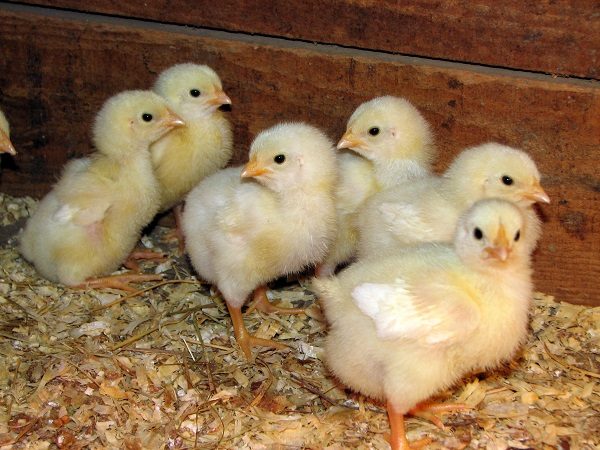
Cross Cobb 500 can be maintained both on a small farm and in conditions of large poultry farms. When breeding poultry in a part-time farm, it should be noted that the chicks in the first days of life require intense heat and light. For a good weight gain, chicks often need to peck on food, which is not possible in the dark, so the first 14 days of coverage should be around the clock.
After this period, "light day" is reduced to 18 hours. The temperature in the house should be in the range of 27-32 degrees. The room should be well ventilated, but without drafts, which are fatal to chicks. Particular attention should be paid to the cleanliness of the room to prevent the incidence of chickens, so before settling a new batch of young stock, it is necessary to carry out general cleaning of the poultry house, whitewashing the walls and ceiling with lime, replacing the litter and carefully washing out the feeder and drinker.
Weight characteristics of the cross
One of the differences of cross - uniformity. That is, all the livestock to achieve a certain age has approximately the same mass. Already in a month the weight of chicks passes for 2 kg, and in one and a half birds weigh an average of 2500-2600, and in 56 days the weight of a bird is over 3 kg.
However, upon reaching the age of 80 days, the growth rate is significantly reduced, therefore, the most favorable period for slaughtering chickens of this cross varies around 40-60 days, although young animals can be slaughtered after 30 days from the moment of birth.
Egg production breed
The cross was bred by crossing such breeds as Cornish chickens and Plymouthrocks. In addition to the two main varieties, several other types of domestic chickens were used to produce the Cobb 500 hybrid.As a result, the resulting cross is distinguished by excellent weight in the first weeks of life, which allows significant savings in the maintenance of poultry.
The meat itself has a pleasant taste, ideal for diet food. Actually, thanks to the painstaking crossing in order to obtain meat breed, an excellent broiler was bred, which, of course, will most likely be born like any bird, but it’s pointless to hope for a high degree of egg production. At best, the number of eggs from under one female will be 2-3 pieces per week.
Broilers, rather than egg breeds of chickens, begin to rush rather late, not earlier than the age of 7 months.
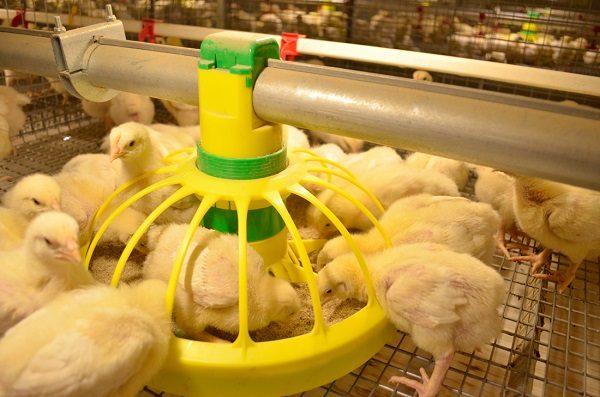
Cultivation and cultivation of Czech broilers at home
For breeding Czech broilers Cobb 500 traditionally used two methods.
- Purchase of hatching eggs at large poultry farms.
- Purchase daily young stock.
You may also be interested to know:
How and what feed broiler chickens from the first days of life.
How to choose and make feed for broilers.
There are several reasons why breeding this variety of chickens in the traditional way is not possible.
- Like most broilers, the Cobb 500 is a cross, in other words a hybrid from mixing different breeds. Qualities obtained as a result of mixing rocks are not inherited.
- Due to the poorly expressed maternal instinct, chickens of this species are not capable of incubating and raising their offspring.
Of course, the cost of hatching eggs will be lower, however, buying already born chicks you can clearly see quality indicators, especially since the young Cobb 500 has a high level of survival related to one of the advantages of breeding this cross.
The most important factors to consider when breeding Cobb 500 chicks.
- Conditions of detention. Since the result of growing broilers is to obtain meat, the conditions of detention should contribute to the earliest possible weight gain.With excessive activity of young stock, weight gain will be lower, which will reduce the profitability of poultry breeding.
- Temperature mode. Birds do not tolerate stuffiness, drafts, too high or low temperatures. If the chickens are crowded in one place in the immediate vicinity of the heaters, this indicates an insufficient temperature for the chicks. When the temperature is too high, the chicks become lethargic, lose their appetite, suffer from heat, so the recommended temperature for birds should be in the range of 30 degrees, allowable fluctuations from 27 to 33.
- Light mode. In the first 14 days of life, it is necessary to organize around-the-clock lighting, after which it is possible to reduce the hours of light supply.
- Full nutrition. The presence of vitamins, trace elements and mineral additives in the feed for chicks is mandatory. Food should be sufficiently enriched with protein.
- Keeping the room clean where are the Broller chickens. Despite the fact that these broilers are less susceptible to infections and diseases than other types of chickens, non-observance of cleanliness can lead to morbidity up to the death of a significant part of the population.
To feed the babies, you can use ready-made commercial feed PK-5 for the young, you can also prepare food at home. When preparing food yourself, it should be noted that greens, small shells, chalk should be added to the feed mixture.
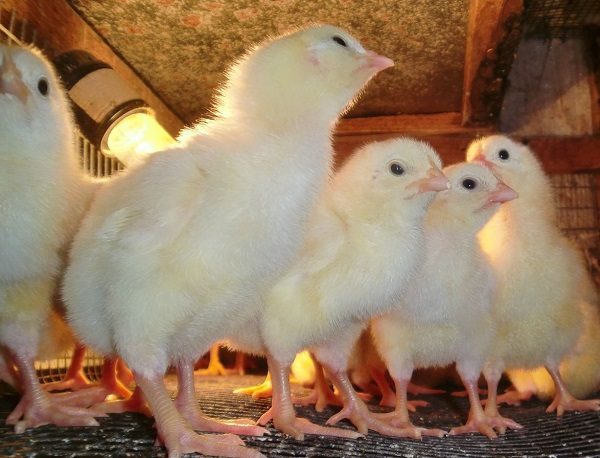
At first, chickens can be given a boiled egg, cottage cheese. Feed the first days should be easily digestible, taking into account the characteristics of the immature digestive system. With the addition of cereals to the diet, it should be borne in mind that with an increased content of wheat in food, the level of assimilation of potassium with phosphorus decreases, which requires additional replenishment.
Feed the chickens should be many and often. In the first week of life, the chicks are fed 7-8 times a day, reducing the number of feedings by two times every subsequent week, until the bird reaches one month of age, when food can be given twice a day - in the morning and evening.
Disease Cross
Cobb 500s have a low susceptibility to disease and good survival rates, but they can also be susceptible to various diseases, usually affecting chickens.Here are some of the most common diseases that broilers can undergo.
- Dyspepsia. Most often, the disease is caused by overdue or unsuitable by age feed, which the chicks are unable to digest due to insufficiently developed digestive system and the lack of necessary enzymes. The disease strikes chickens during the first time after birth. Dyspepsia causes severe poisoning of the body, which manifests itself in the form of white or yellow liquid feces with undigested food particles against the background of weakness and lack of appetite.
- Bronchopneumonia. May occur on the background of hypothermia. You can determine the severity of breathing with an open beak, wheezing when breathing, stretching the neck. Treatment must be prescribed by a veterinarian, otherwise the death of a sick bird is possible.
- Marek's disease. The incidence of its broilers can reach up to 85%. Symptoms include lameness, drooping wings and tail, twisting of the neck, and sometimes complete or partial visual impairment. An accurate diagnosis can only be made by a veterinarian.
- Avitaminosis. Due to rapid growth, the lack of vitamins in broilers can be felt much more acutely than in non-meat breed chickens.To prevent beriberi, the diet of poultry should be enriched with additional vitamins when feeding poultry with non-specialized feed, where the composition already contains the required amount of necessary substances.
- Enteritis. Inflammation of the gastrointestinal tract. Chicks of early age are exposed, the treatment is carried out with preparations of antibacterial spectrum of action.
- Aspergillosis. The disease caused by the fungus affects the respiratory tract. As a rule, aspergillosis occurs in violation of conditions of detention, which contributes to the reproduction of the fungus.
- Salmonellosis. A disease that is dangerous not only for chickens, but also for humans. In the case of infection with salmonellosis, the diseased individuals are subject to slaughter without use as food.
Advantages and disadvantages
Summing up, we can distinguish the following advantages of the Cobb 500 cross.
- Rapid weight gain in an extremely short time, allowing for the slaughter of broilers at the age of 30 days.
- Yellow skin pigmentation.
- Low feed costs.
- High survival factor.
- Suitable for breeding in the conditions of large poultry enterprises, and for small farms.
- Low susceptibility to common chicken diseases.
- The homogeneity of individuals of the same age of both sexes.
The disadvantages of broilers of this species include the lack of possibility of breeding in the traditional way for birds and cold intolerance, which significantly increases the energy consumption in the process of growing in some regions in more severe climatic zones.
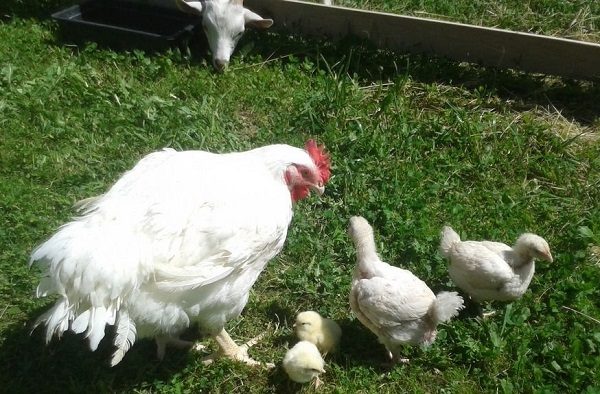
Table of the ratio of weight and feed consumption of broiler chickens
Below is a table that clearly shows the ratio of weight and feed consumption for broiler chicken.
| Age, days |
Live weight, kg |
Feed consumption gr / day |
Feed consumption from the beginning of fattening, gr / goal |
| 0 | 0,042 | 0 | 0 |
| 1 | 0,052 | 14 | 14 |
| 2 | 0,066 | 14 | 28 |
| 3 | 0,082 | 15 | 43 |
| 4 | 0,100 | 16 | 59 |
| 5 | 0,120 | 22 | 81 |
| 6 | 0,142 | 25 | 106 |
| 7 | 0,166 | 28 | 134 |
| 8 | 0,193 | 31 | 165 |
| 9 | 0,223 | 35 | 200 |
| 10 | 0,256 | 39 | 239 |
| 11 | 0,293 | 44 | 283 |
| 12 | 0,334 | 49 | 332 |
| 13 | 0,379 | 55 | 387 |
| 14 | 0,427 | 61 | 448 |
| 15 | 0,478 | 68 | 516 |
| 16 | 0,532 | 75 | 591 |
| 17 | 0,589 | 83 | 674 |
| 18 | 0,649 | 91 | 765 |
| 19 | 0,712 | 99 | 864 |
| 20 | 0,778 | 106 | 970 |
| 21 | 0,846 | 112 | 1082 |
| 22 | 0,916 | 118 | 1200 |
| 23 | 0,988 | 123 | 1323 |
| 24 | 1,062 | 128 | 1451 |
| 25 | 1,137 | 133 | 1584 |
| 26 | 1,213 | 137 | 1721 |
| 27 | 1,290 | 141 | 1862 |
| 28 | 1,368 | 145 | 2007 |
| 29 | 1,447 | 149 | 2156 |
| 30 | 1,527 | 153 | 2309 |
| 31 | 1,608 | 157 | 2466 |
| 32 | 1,690 | 160 | 2626 |
| 33 | 1,773 | 163 | 2789 |
| 34 | 1,857 | 166 | 2955 |
| 35 | 1,942 | 169 | 3124 |
| 36 | 2,027 | 172 | 3296 |
| 37 | 2,112 | 175 | 3471 |
| 38 | 2,196 | 177 | 3648 |
| 39 | 2,279 | 179 | 3827 |
| 40 | 2,361 | 181 | 4008 |
| 41 | 2,442 | 182 | 4190 |
| 42 | 2,522 | 183 | 4373 |
| 43 | 2,601 | 184 | 4557 |
| 44 | 2,679 | 185 | 4742 |
| 45 | 2,756 | 186 | 4928 |
| 46 | 2,833 | 187 | 5115 |
| 47 | 2,909 | 188 | 5303 |
| 48 | 2,984 | 188 | 5491 |
| 49 | 3,058 | 188 | 5679 |
Cobb 500 broilers can be an excellent option for both small farms and industrial poultry farms due to the factthat these birds do not need long-term feeding for a set of optimal weight, which is very effective in terms of cost-benefit ratio.
Even in a small area during the summer season, you can grow 2-3 generations of the Cobb 500, whose meat has excellent taste and attractive presentation, taking advantage of the high demand of consumers.
Anton: The case is troublesome, but very profitable, about the time spent (and it takes a lot) I do not regret at all. Contained cellular way. He received the first batch of chickens using an incubator (hen). It turned out well, because it strictly adhered to the recommendations. The second batch of 150 pieces purchased at the poultry farm after the first sale.
Growing well in compound feeds, weight gain controlled, weighing 10% of the number of birds. The weight increased only slightly behind the standard.
The cells were assembled by myself from the materials at hand, but according to the description in the special literature. I bought only special drinkers.
In general, I finish bragging and summarize: it is worth working, because you get not only high-quality meat, but also a good income.Here, now I have already ordered the first batch for this year for the end of February (there is no time to mess with the incubator now) and I will take up this business closely.
Kostya Ufimtsev: Diluted broilers for meat. Pleased with the result: a huge amount of very tasty meat. Enough for their own food and for sale. The main thing is to follow the rules of breeding and everything will turn out.
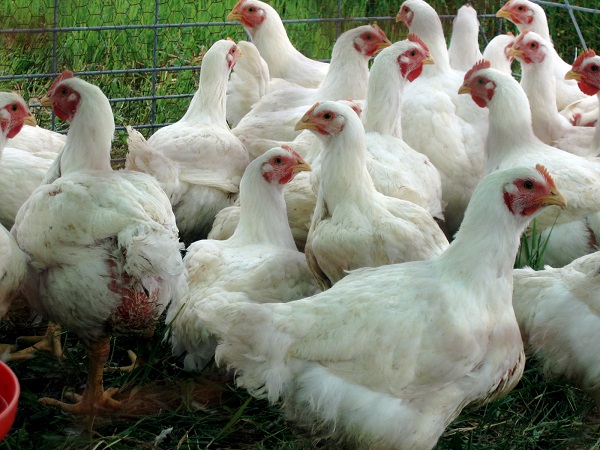
I wonder how developed in Russia this business is to grow Cobb 500 broilers. Are there many such farms. Are they profitable. And what is the largest and where is it located?
Olga, this breed is one of the most popular broilers. At the expense of the largest farm will not tell you.
After winter there are a lot of potatoes left, is it possible to feed it to broilers?
From two weeks of age, boiled potatoes go to wet mashes. In its pure form is not recommended.